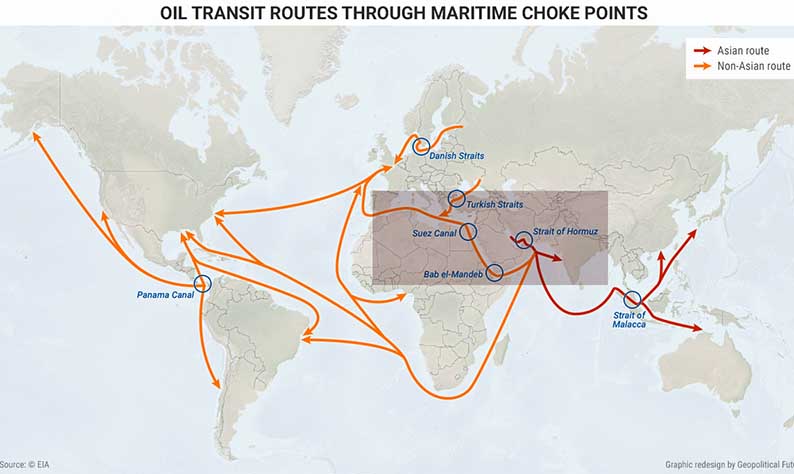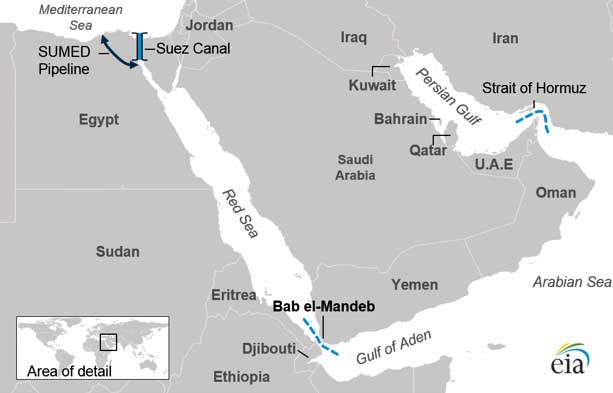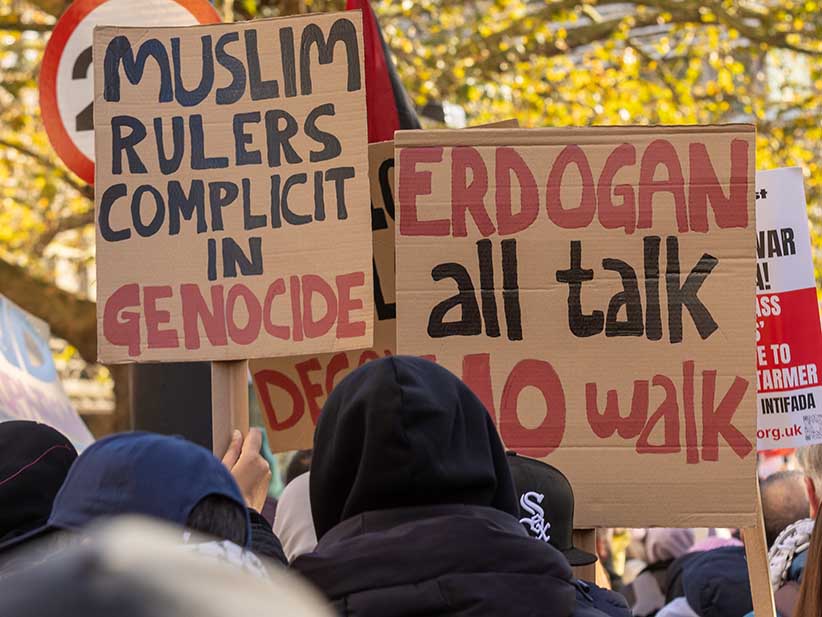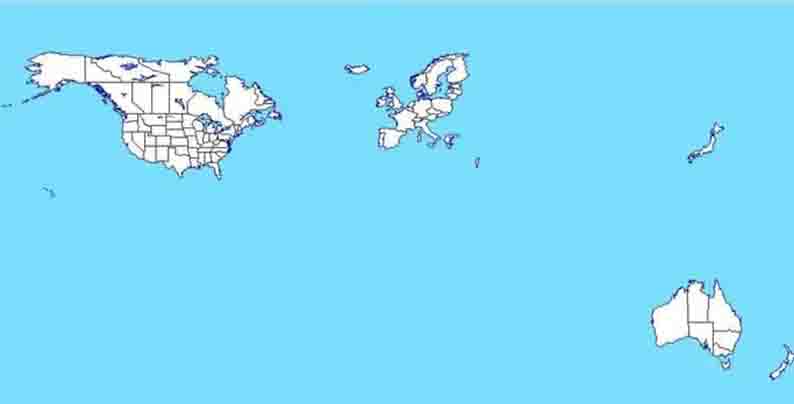Update December 29: a useful follow up to this post is given by a John Helmer piece on Naked Capitalism. See no innocent ships. 1
*
One thing about the Middle East 2 is that its shipping lanes have many choke points: narrow but vital waterways easily subjected to stranglehold in times of rising tension.

To the northwest the Gibraltar Strait (8 miles at its narrowest) links the Mediterranean with the Atlantic. In the northeast corner of the former, the Dardanelles (1.2 miles) lead to the Marmara then Black Sea, hence Odessa and Crimea. To the southeast the Hormuz Strait (28 miles) offers a choke on the only passage from Persian Gulf to the vast expanse of the Indian Ocean, 3 while to the southwest the Bab el-Mandeb puts a squeeze on shipping from the Indian Ocean to the Mediterranean via Red Sea and Suez Canal (itself a choke point). The Bab el-Mandeb is split by Perim Island into a west channel 16 miles wide and overlooked by Djibouti and Eritrea on the Horn of Africa, and an east channel 2 miles wide and overlooked by Yemen on the Gulf of Aden.

It is that last, the Bab el-Mandeb, which most matters here.
Yemen’s Houthi and allied forces control four fifths of their country, having fought Saudi Arabia – merciless, and backed all the way by the USA and Britain – to a standstill. Rightly feared by Israel, the Houthis are a nightmare in waiting for the floating pointlessness of two US carrier groups sent to the region after October 7.
They are also uniquely placed to disrupt traffic – partly by outright attack but more importantly because the mere threat has sent shipping insurance rates soaring – in the Bab el-Mandeb. 4
Before I hand over to Ben Norton and his masterly overview of choke points, “Houthis”, Israel’s economic vulnerability and much besides, let me note the following:
- The West stands horrified as mass murder is done but its oligarchs, and the governments they in effect control, 5 back unconditionally – for reasons given here – the lawless state perpetrating that ongoing crime against humanity.
- Leaders in the Arab world denounce Israel – in English and, doubtless, a shared language renowned for its colourful pejoratives – but fall conspicuously short of committing to any action that could alleviate the horror. 6
- Ditto leaders in the wider Sunni world.

London protests, November 11. More pictures here …
Which leaves just two actors doing anything. 7 One is Iran, which backs the Houthis and calls for an OPEC embargo on Israel, a demand OPEC refuses. The other is the de facto government of Yemen, aka the Houthis. 8
And they are making life very difficult for Israel …
* * *
- John Helmer’s piece can also be found on his own site. I do like to credit authors on their home turf but John’s use of white text on a dark background, in feature length posts, is in my book a hanging offence. My solemn duty to spare my public such retinal assault has me linking in this instance to Naked Capitalism, which picked up and ran the excellent piece in tried and tested black on white.
- It’s PC to axe “Middle East” in favour of “Western Asia” and I get the logic. The former is, like Greenwich Mean Time,` old colonial. But the region which both terms refer to is often taken to include African states like Libya, Egypt, Algeria and – significant re the Gibraltar choke point – Morocco. Given this, and the fact that “Middle East” is universally if vaguely understood, while I frown on the terminological fixations of political correctness, I’ll stick with it for now. Pick your battles, I say.
- The significance of the Hormuz Strait – through which one third of the world’s LNG and a quarter of its oil pass – and Iran’s ability to shut it down regardless of US aircraft carrier presence, are addressed by Ben Norton in the linked video.
- It is a mark of the esteem in which Russia is held by the non Western world, courtesy her imminent defeat of the US in Ukraine and pragmatic but principled position on Palestine, that Russian ships are exempt from Houthi actions. And it is a mark of how ill served we in the West are by the lies, including those of omission, of systemically corrupt media – whose ‘quality’ no less than ‘popular’ wings unfailingly demonise leaders who prioritise their own people’s interests over those of the US empire – that so few of us are aware of President Putin’s high standing in the global south.

The “international community” as implicitly depicted in Western media.
- On oligarchic control and the illusion of democracy, Chris Hedges notes: “Those who wrote trade deals to profit from unemployment and underemployment of U.S. workers and sweatshop labor overseas are omnipotent. The insurance and pharmaceutical industries that run the healthcare system for profit instead of health are omnipotent. The intelligence agencies that carry out wholesale surveillance of the public are omnipotent. The courts that reinterpret laws to excuse corporate crimes are omnipotent. Politics is spectacle, a tawdry carnival act where a constant jockeying for power by the ruling class dominates the news cycles, as if politics were a race to the Superbowl. The real business of ruling is hidden, carried out by corporate lobbyists who write the legislation, banks that loot the Treasury, the war industry and an oligarchy that determines who gets elected and who does not. It is impossible to vote against the interests of Goldman Sachs, the fossil fuel industry or Raytheon, no matter which party is in office.” For reasons given in Why read Michael Hudson? these truths apply only a tad less blatantly to the west at large.
- To give Arab leaders, as distinct from Arab Street, their miniscule due, almost all of them – including Cairo and Riyadh – declined to join Uncle Sam’s grandiosely titled Operation Prosperity Guardian. The sole exception is tiny Bahrain: militarily inconsequential but a de facto car park for US warships, and lending a fig leaf of regional cover to what, outside the brainwashed West, is a glaringly imperialist coalition.
- Actually there are more than two actors “doing something” but to keep things simple I’m ignoring Hezbollah in both Southern Lebanon, where it defeated Israeli ground forces in 2006 but is poised this time to take the fight into Northern Israel, and Syria, where it has since October 7 stepped up its attacks on the US presence – unlawful even before we get to its attendant oil theft – in the country’s southwest.
- In a recent Duran video Alexander Mercouris notes that “Houthis” prefer the term, Ansar Allah. For his part Ben Norton notes that the etymology of “Houthi” renders it inaccurate given the coalition nature of Yemen’s de facto ruling alliance, which contains both tribal and political currents: socialists, nationalists, and Zaidi Shia whose faith is as far removed from Iran’s Shia as it is from the region’s Sunni majority.
